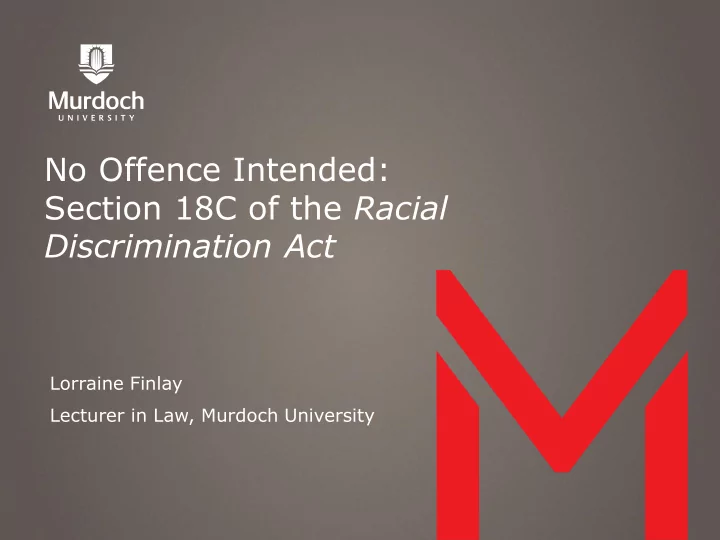

No Offence Intended: Section 18C of the Racial Discrimination Act Lorraine Finlay Lecturer in Law, Murdoch University
Section 18C 1. It is unlawful for a person to do an act, otherwise than in private, if: a) the act is reasonably likely, in all the circumstances, to offend, insult, humiliate or intimidate another person or a group of people; and b) the act is done because of the race, colour or national or ethnic origin of the other person or of some or all of the people in the group. 2. For the purposes of subsection (1), an act is taken not to be done in private if it: a) causes words, sounds, images or writing to be communicated to the public; or b) is done in a public place; or c) is done in the sight or hearing of people who are in a public place. 3. In this section: “public place” includes any place to which the public have access as of right or by invitation, whether express or implied and whether or not a charge is made for admission to the place.
Overview 1. Background & Current Controversy 2. How has 18C been interpreted? 3. Does 18D provide the necessary balance? 4. Constitutional Validity: a) External Affairs Power b) Implied Freedom of Political Communication 5. Case Examples 6. Where to from here?
Background & Current Controversy “The Coalition will repeal section 18C in its current form.” The Hon. Tony Abbott MP (Leader of the Opposition) 6 August 2012 “When it comes to counter -terrorism, everyone needs to be part of Team Australia. The Government’s proposals to change 18C of the Racial Discrimination Act have become a complication in that respect. I don’t want to do anything that puts our national unity at risk at this time and so those proposals are now off the table”. The Hon. Tony Abbott MP (Prime Minister) 5 August 2014 “This is clearly a bad law.” The Hon. Tony Abbott MP (Member for Warringah) 23 April 2016
Balancing Human Rights & Freedoms
How has 18C been interpreted? 1.Low Harm Threshold “Protecting people’s feelings against offence is not an appropriate objective for the law.” The Hon. James Spigelman QC 2. “Reasonably Likely” – not actual outcome 3. “Reasonable Victim” Test 4.Failure to prohibit racial vilification
Section 18D Section 18C does not render unlawful anything said or done reasonably and in good faith: a) in the performance, exhibition or distribution of an artistic work; or b) in the course of any statement, publication, discussion or debate made or held for any genuine academic, artistic or scientific purpose or any other genuine purpose in the public interest; or c) in making or publishing: i. a fair and accurate report of any event or matter of public interest; or ii. a fair comment on any event or matter of public interest if the comment is an expression of a genuine belief held by the person making the comment.
Section 18D Does s 18D provide the necessary balance to s 18C by restricting its impact on freedom of speech? • “Reasonably and in good faith” • Truth as a defence • Equality before the law • Reversing the relation between the right and restriction
Constitutional Validity 1. External Affairs Power International Convention on the Elimination of All • Forms of Racial Discrimination Conformity Requirement • 2. Implied Freedom of Political Communication a) Does the law effectively burden the freedom in its terms, operation or effect? b) Are the purpose of the law and the means adopted to achieve that purpose legitimate, in the sense that they are compatible with the maintenance of the constitutionally prescribed system of representative government? c) Is the law reasonably appropriate and adapted to advance that legitimate object McCloy v New South Wales [2015] HCA 34
Case Examples • 838 complaints to Australian Human Rights Commission under 18C over the last six years. • Two contrasting examples: 1. Cindy Prior & QUT Complaint 2. Eddie Betts & ‘banana throwing’ football fan
Where to from here? 1. Does Australia need anti-racial vilification laws? 2. Is 18C – in its current form – achieving its objective? 3. Should 18C be amended or repealed? 4. If yes, then: (a) is this a priority? (b) who should change it?
Recommend
More recommend